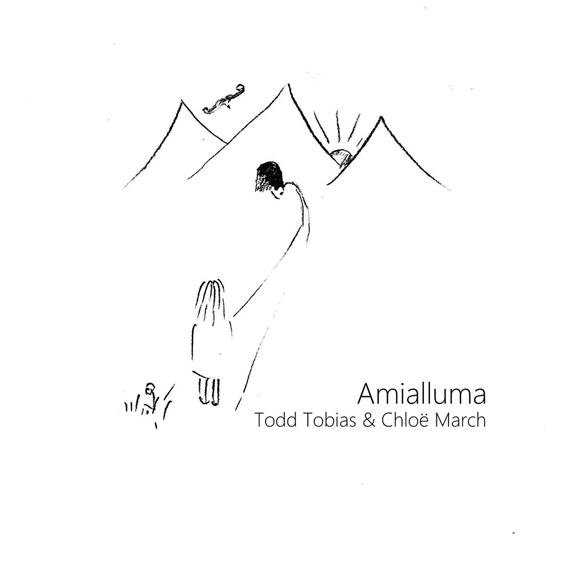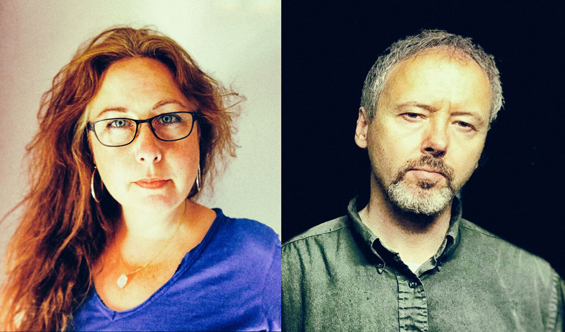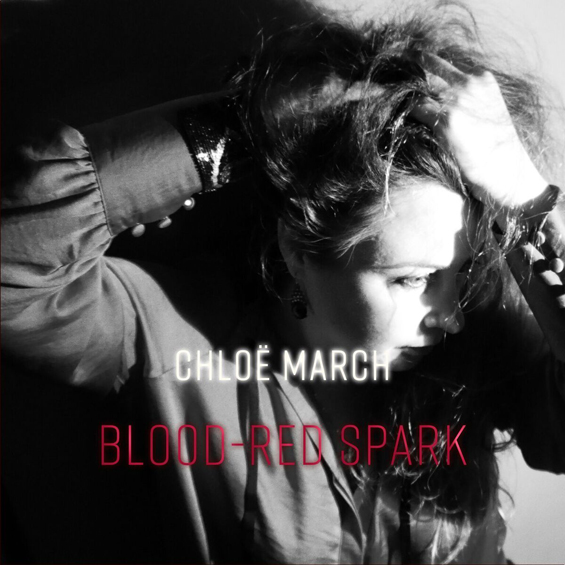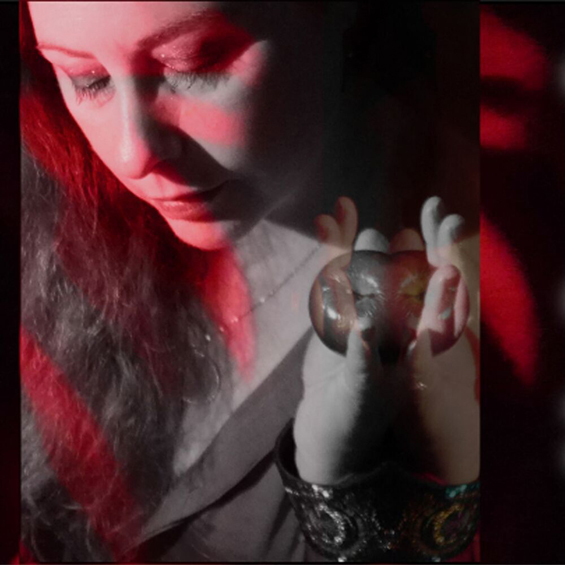

FIVE QUESTIONS WITH CHLOË MARCH
Fourteen years on from her debut album Snowdrop, Chloë March continues to mesmerize, this time in collaboration with ambient soundcrafter Todd Tobias on the thoroughly entrancing Amialluma. It's not the first time March has teamed with another; in fact, the number of collaborative projects with which she's been involved probably rivals in number the releases she's issued under her own name. Regardless of whether the album's a solo outing or a joint release with Tobias, Jumpel, or Markus Mehr, the result is always enhanced by the presence of her lustrous, sensual voice. She's that rare artist whose music has improved with age, in part due to her growing confidence as a songwriter, arranger, and, yes, even singer; no more compelling evidence than Amialluma and her recent solo album Blood-Red Spark are needed to argue as much. The British songstress recently spoke with textura about her development as an artist, the processes by which Amialluma came into being (including the decision to have March sing words from an ‘imagined language' rather than a known tongue), and what she does to maintain her exquisite vocal sound, and we're grateful to her for making time to do so.
1. Amialluma is the second collaboration you've done with Todd Tobias, with 2015's Gila Man (issued under his name rather than jointly) the first. How did the production of this new one differ from the earlier one, if it did? And were the contributions clearly split between the two of you on Amialluma, with you contributing the vocals and Todd the instrumental material?
With Gila Man, Todd approached me with the instrumentals he'd already written and an idea of me adding textural vocals, so nothing too melodic, but instead thinking of my contribution more as another instrument in the mix. Amialluma became something very different. It was still a case of me being sent Todd's instrumentals, but there was a much more precise vision for what we were doing. In the early stages, he spoke about lullabies, and it was clear that the vocals were going to be much more front and center. From there, the project kind of blossomed and bloomed organically into something quite uniquely its own thing. I felt like something emotionally powerful was happening very soon into working on it. The idea of the album being issued in both our names came from Todd and was to reflect the impact that my vocals and word-invention had had on the project. I was so pleased when he suggested it, as the process meant a great deal to me and I'm so proud of the album.

2. What is the language the lyrics are set in on Amialluma, and did you fashion a particular narrative for the album? Why did you adopt a non-English approach for the words, given the immediacy and clarity with which the lyrics' meanings would have communicated had they been set in a known language? Could you also say a few words about some of the unusual vocal techniques you used on Amialluma?
It was a clear direction from Todd, right before me even hearing his music, that he wanted non-English lyrics, or an ‘imagined language' for this album. I was excited to try this and also pretty scared as I wasn't sure if I could pull it off without sounding silly or leaning too heavily into the influence of the Cocteau Twins. I've been a huge fan of theirs for a long time so obviously I was very aware of that inspiration, but I really wanted my vocals to hold their own space and be particular to these stories and to my and Todd's creative worlds.
What helped was that Todd also had a powerful idea about the lullaby aspect of the project. So I had a great starting point; I had the idea of singing to a child, of not using any words I already knew and then I received the music, which really spoke to me and conjured up atmospheres and situations and feelings that I could play with. My own work is very much centered around the imagery of my lyrics, so it was liberating for me to play with the pure emotion and meaning of vocalization itself. That precise clarity of meaning in the words isn't there, but I believe deeply in the power of music to communicate, and I don't think that we always have to understand the words being sung to feel the emotional impact or narrative. If I did it right then I felt that also the intonation of what I was singing could tell a story. I think too we were after a kind of enigmatic feel, so if I'd sung in English it would have pinned it all down too much and it seemed fitting that it's now very open to individual responses and interpretations.
Todd had also spoken about an archaic world, so I had a powerful feeling of trying to conjure a pre-language kind of atmosphere. After I sent the first vocal takes to Todd he suggested going further with this feeling and taking sounds from the natural environment, like birdsong. I'm fascinated by birdsong anyway so that was lovely. I get obsessed with the dawn chorus in spring and am often just mesmerized by the sound of it. It makes sense to me that as human beings we were possibly influenced by birdsong in our first efforts at speech and absolutely in song. So that's where the trills came from; I was trying a bit of imitation but in quite a naive, spontaneous way. I ‘invented' some words that did have meaning for me across the songs, but it was also a case of sounds and intonation having meaning, in the way you might talk nonsense to a baby or an animal. It felt primal and powerful and very loving.
The title has a very clear meaning—Todd asked me to come up with a word that meant ‘a companion in times of darkness', so I came up with Amialluma—which translates for me also as ‘friend of light.'
It's hard to talk about the narrative as this was such an organic process and right from the beginning I was working with what Todd's music was expressing to me and hearing his ideas about the intention of the album. Once my vocals were springing from that, a new story emerged which was then formalized very near the end of the whole process, with Todd adding instrumentals to augment it. He also created a clear narrative story inspired by the songs we'd finished that I used for the drawings I created for the album cover, a series of twelve pencil illustrations, five of which are reproduced on the CD packaging. You can see all of them in the promo video that was made for the album.

3. Mood plays such a critical role in Amialluma with its music and vocals conjuring a wholly absorbing realm that's vivid, otherworldly, enigmatic, and celestial. When you're recording your parts for such a project, do you have to get into a particular mood or state of mind, or are you like one of those actors who can switch on a role the second the scene starts? And are there certain conditions that must be in place in the setting where the recording takes place for that mood to be achieved or again is the environment irrelevant for you during the recording process?
I think the recording process for me absolutely depends on the music. Maybe my mood to a certain extent, but if I'm connecting to the music on an emotional level then it doesn't take long to get in the right state of mind.
For Amialluma I was deliberately recording a spontaneous vocalization so it was more of an improvising situation than I would use in my own work; I needed to visualize the situation of the song intensely. For instance, the track “Inttavei”: that was very specific in my head, me singing to a group of small children in a cave, telling them a story about a scary monster outside who might eat them up if they were naughty or strayed too far off the paths outside the cave … I needed quite a lot of concentration for that. But I used to do quite a lot of acting—I studied drama at university—so I really enjoyed getting back to that frame of mind a bit.
My vocal recording set-up is actually in a small converted walk-in cupboard. There's just enough room in it for me to stand at the mic, but it has a nice high ceiling so doesn't feel too claustrophobic. It's as soundproofed as I can make it and full of old scores and electrical equipment; I really like the sound I get in there, so I daren't clear it out just in case it affects it too much! There are some songs that I feel I want to record pretty much in the dark with just a little string of lights so there's a bit of a nice vibe. The most important thing for me is that I'm inside the song properly, sometimes even imagining a small audience in front of me who I then feel I'm connecting with directly; that can help with making a recording feel more alive I find.

4. The typical textura interview is strategically timed to coincide with the release of a new album, in this case Amialluma. I'm also curious, however, about the emotional trajectory the artist experiences in the time period surrounding a project's release. Is there an almost delirious high of expectation as the release date approaches, for instance, and does an almost postpartum-like state set in after it's released into the world? Using your acclaimed Blood-Red Spark as a sample case, what emotions did you experience in the times before and after its release?
I think I'm a bit more ‘earthed' about releases now, though there were definitely moments of delirium! The first time I felt really excited about Blood-Red Spark was when I got the tracks back from mastering. It's a scary moment and on previous albums I've experienced an awful sensation of only being able to hear my failings at that point, but this time I was very happy and quite surprised by the power that the songs held as an album. I was really pleased with the soundworlds of the tracks and how they worked together, so it was a good moment. I wanted to make a sensual, immersive album and I felt that I'd achieved that. I've had incredible support from Cam Merton at Hidden Shoal over the years, and he was one of the first people to hear the final version. His feedback was wonderful so that was a real boost. The album felt more emotionally honest and personal than what I'd released before, and I really wanted it to connect with people so there was some anxiety around that.
I've been on the margins of this industry for a long time and am used to just getting on with my work and being true to it and letting it guide me when I'm in doubt or worrying about how I'm being perceived. I knew deep down that I'd made an album I could feel really proud of and kept telling myself that self-doubt and anxiety have to do with reactions and opinions I can't control. The only thing I had control over was the music I was offering and the way I was offering it. So just trying to only focus on those things has become my key to calming those violent mood swings over the release period!
When it was released I felt some curiosity mixed in with the excitement and fear of how people would react to this slightly different direction I was going in. I had an immediately lovely response from my fans, who have supported my music for years, so that was wonderful. When I started to see some very positive reviews that was so great and then some radio play started happening and that was fantastic. I still get very emotional when my songs are played on air; it's an extraordinary experience, almost out-of-body I find and it can be hard to feel anything real when it's happening. I was moved when the album did seem to resonate with people and seems to have connected in the way I'd hoped. My emotion over that has got more intense over time. I also felt a lot of gratitude, for being able to make the music in the first place and for the people it reaches and for how they let me know; it's always made me very emotional to hear when that connection has been made.
There was also the anti-climax that always kicks in about a month after release, when I was still very attached to the album but the initial promo was all done. I'd worked on it for three years so it felt very close to me, and I think it would have been wonderful to do some gigs at that point. That wasn't something I'd been able to arrange for many reasons, but I think it would really help with the whole process of taking a new album out into the world. So I just had to try and let go; at that point the music stopped belonging to me, it had a life of its own beyond me and I just had to let it make its way.
5. You've released a number of collaborations and solo albums since your first solo album, Snowdrop, appeared in 2004. In what ways have your working methods and creative process changed in the fourteen years since that beginning? And is there a standard process you go through when you're creating a song or do they come into being in different ways?
This has really got me thinking and also tracking back methods and processes that circle right back to the beginning, which was at least ten years before Snowdrop, when I started writing songs at the piano. I won't try and go through another decade or so, but I think there are two different processes that I've always used. One is to start at the piano, through improvising and the other is when a huge amount of inspiration for the song is sparked by the instruments or sounds I'm writing for. I've written a lot for French horn over the years as my sister is such a beautiful player, and she features a lot on Divining, my second album, which has a distinct silvery sound world that is very informed by that. For Nights Bright Days, my third album, I had an amazing clarinet/sax player to work with too, so that informed a lot of the atmosphere of that album, which I think of as being quite sinuous and jazz-inflected.
Discovering my sister's boyfriend's synth when I was a teenager triggered a passion for pads and textures that's never left me and really has only gotten deeper with time. Now I just love all the digital synth sounds and just finding one of those that I think is gorgeous and I can play with can trigger a whole song. Blood-Red Spark is quite informed by that and my exploration of how much I could do with my voice and the sounds at my fingertips.
I'm always writing for my voice and obviously that's changing over the years, both the range and also how I use it. I think a constant is that I always try to find emotion in harmony and the shift of one chord to another; I think that's what I spend most time on and where my interest truly lies.
The songs come into being in different ways, and they can morph through many different forms, too. Occasionally one will come to me very quickly, and I'll write it within an hour. Sometimes I'll have lyrics finished that I then score like a film, and sometimes I can almost visualize the song I want to write; I hear a sound palette in my head and have a few words that spark ideas and imagery. I've written music for both theatre and dance and have really enjoyed that intense creation of atmosphere, so I often feel like that's what I'm doing in miniature, creating little reels of self-contained worlds. Two of my albums have had themes I've written around: water for Divining and more loosely, the night, transformation and Orpheus for Nights Bright Days. I found it helped me to focus and rein myself in, but it was also great just to let the songs evolve for Blood-Red Spark and witness what they were becoming without an imposed theme. (I've written a piece about the writing of that album over at my website).
It was putting that first album, Snowdrop, together that made me feel so frustrated at not being in control of the recording process. I was desperate to create these big, multi-tracked arrangements, and I found it quite hard to explain to the studio engineers the particular effects I was after, plus the time/money constrictions were difficult. The songs on Snowdrop were a mix of piano ballads and tracks that I'd put together on my Roland XP-60. At home I was able to record sixteen synth tracks onto a disk and then record that mix onto a little Fostex multitracker—overdubbing my vocals until the cassette tapes literally wore out and snapped! So I knew what I was after but just longed for the time and equipment to work on the music properly.
That happened in 2005 when I got Logic and started to work on Divining and that was the turning point for me, when I could finally be in control of the music I was making. I'd been on tour as keyboard player with Cousteau and working with other musicians quite intensively, so it was a big change to suddenly be alone again with my own music. It was also a massive learning curve, and it took a few years for me to teach myself how to mix and record properly and find my way around Logic, so a lot of my songwriting was fraught with technical problems that I would literally be banging my head on the desk about. The software was so huge and my computer couldn't really deal with it, so I used to spend hours waiting for songs to load, especially if it was one with more than ten tracks. I also experimented a lot with found-sound for that album, using paper, glass, wind chimes, and grass, etc. to augment the digital sounds.
Since then everything has got better, the computers I work on and the software itself, and I'm a lot more confident now, both with the whole recording/mixing process and with my own writing. I'm really happy to cut and edit myself and play around, which is the most important thing I've learnt over the years. I have to be disciplined with myself as I work alone so there's a danger of self-indulgence that I'm very aware of.
It's really lovely when guest musicians come over to record or I go to them. Working with another musician in the room bouncing ideas and having a laugh is so nice. I've really enjoyed the online collaborations, too; sharing ideas and working with people in different countries is just an astonishing thing. It's a very different way of working. I love singing to music that someone else has written that inspires me; it's expansive for me and hopefully for them too.

Bonus question: Your voice has never sounded better than it does on Blood-Red Spark and Amialluma. Did you formally develop your vocal delivery or is it simply a natural gift, and do you do anything to maintain and nurture it?
Thanks so much for your lovely words. It's quite emotional for me to hear as I've had ups and downs with my voice like many singers. I didn't believe in myself as a singer for a long, long time. I sang and recorded my own songs from when I was sixteen and absolutely loved singing when I was little, but I never thought I was a proper singer; it took someone at university to force me to sing on stage in a production, I mean literally to physically push me onto the stage during rehearsal, for me to finally perform in public and think that maybe I had some talent.
A few years after that I started to have lessons in classical technique and I went on to have five more different teachers, slowly moving from classical to jazz (with the brilliant Barb Jungr) to finally just working on body/voice. That was over a period of over ten years. Then I stopped having lessons and let myself be a bit less hyper-critical of what I was doing. All of my teachers gave me something invaluable in terms of technique or approach. I do quite a lot of hushed close-mic vocals, and that can be damaging for your voice if you don't warm up properly. I find those very intense and quiet vocals take a huge amount of support and control; they sound effortless (hopefully!) but are physically hard work. My last teacher was wonderful and recorded a warm-up session with me that I now use every day as a practice routine. I've learnt and still learn huge amounts by watching and listening to singers I love, too; it's a fantastic way to learn.
One of the best things I've ever done for my voice is to take up Tai Chi, which I started learning about eight years ago. I train every month with a Chinese Master in London who is one of the most inspirational people I've met. For me, the combination of relaxation, flow, focus, and muscular strength is absolutely key to singing. I have some stresses and health problems in my life and that can directly affect my voice, so being able to practice Tai Chi has got me through a few difficult times. I gave up alcohol five years ago, limit coffee intake as much as self-discipline allows, and I drink a lot of water before and after singing. Also like a lot of singers, I find the act of singing and all the different often psychological factors on the voice fascinating so I'd better stop myself here!September 2018![]()